Centering Community is Core to Health Equity
UIC's academic health enterprise, UI Health, is based in the nation's largest urban healthcare community: the Illinois Medical District (IMD). Centered at the gateway to Chicago's South and West Sides, UI Health is committed to providing high-quality, innovative health and wellness services to some of the nation's most diverse communities. As the state's only public academic health enterprise with seven health science colleges and diverse health professions programs, UI Health is uniquely positioned to train future healthcare leaders, pursue innovative research, and translate our expertise to compassionate patient care for neighborhoods across Chicago, communities throughout Illinois, and beyond. UI Health's commitment to the community is a responsibility to engage our patients and community partners to address health disparities in pursuit of health equity.
The UI Health community remains actively engaged with communities locally and across the state to design health interventions and practices that can improve the health and well-being of patients and their families. Listed below are some of the distinct UIC programs and centers that are dedicated to supporting communities in taking control of their health and wellness.
UI Health With the Community Heading link
Community Events Heading link
Free Screenings for Oral, Head & Neck Cancers - 4/29 to 5/3
Wellness House at Mile Square Main Location
Organizational Wellness: Caring for the People who are Caring for our Communities
Office of Community Based Practice at Mile Square Health Center Heading link
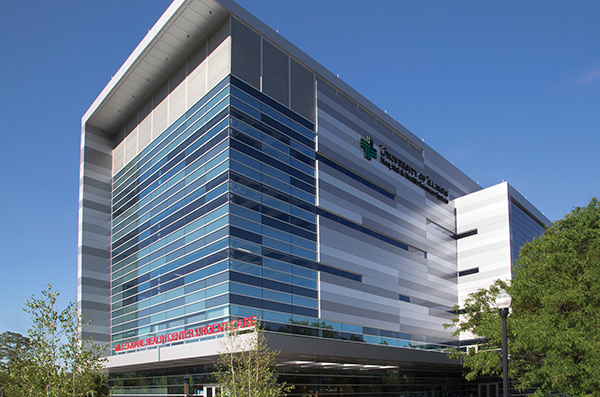
The Office of Community Based Practice (CBP) aims to involve community members, community based organizations, local agencies, researchers, and other stakeholders as partners in the mission to foster equitable access and delivery of comprehensive, quality care for all Chicagoans seeking care at the Mile Square Health Centers (i.e., health care screenings, preventive consultation, diagnostic services, and treatment) and affiliated clinics through research, evaluation, and learning. The overarching goal of CBP is to eradicate health inequities, promote continuum of care, and improve health outcomes.
Community Engagement and Health Equity Office at the UI Cancer Center Heading link
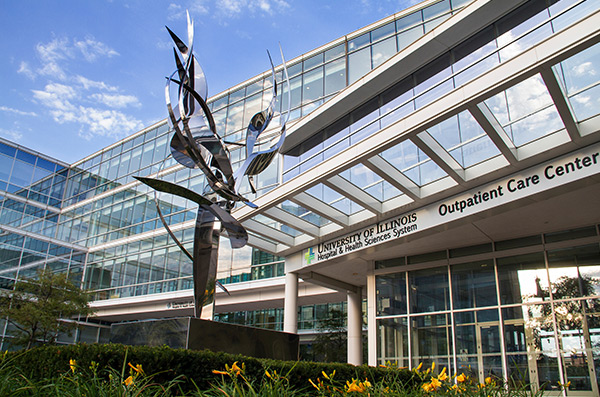
The University of Illinois Cancer Center is the only public university-based cancer center in Chicago dedicated to the pursuit of health equity and erasing disparities in the prevention, screening and treatment of cancer. The Cancer Center’s Community Engagement and Health Equity Office (CEHE) works to decrease cancer burden and increase access across the cancer care continuum by building relationships with community partners to increase access to cancer screening and care, to disseminate knowledge, and to advocate for meaningful public policy reform.
In 2022, CEHE engaged 10,604 community members through 227 outreach and engagement activities and 140 community partnerships with the aim of to defining and monitoring cancer burden; promoting and conducting community-informed, evidence-based outreach and education; informing and fostering community-engaged research; and supporting the development, implementation and dissemination of policy and advocacy initiatives.
Office of Community Engagement and Health Partnerships Heading link
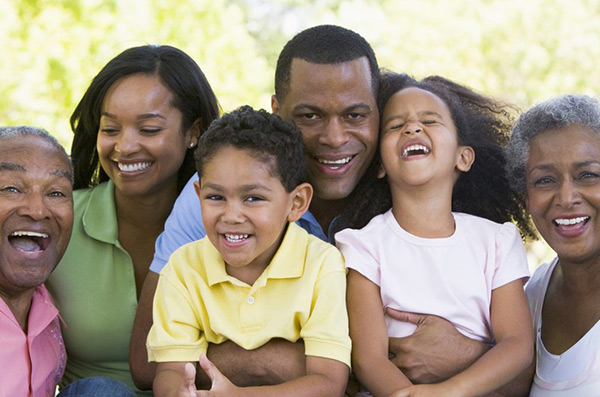
The Office of Community Engagement and Neighborhood Health Partnerships (OCEAN-HP) supports unique partnerships that enliven the mission of the University of Illinois at Chicago and engage community-serving organizations in cooperative efforts to improve Chicago communities. OCEAN-HP has a campus-wide focus that extends to all UIC colleges, with a focus on developing, facilitating and sustaining viable and mutually beneficial campus-community partnerships. Major areas of concentration include:
- Health professional and lay health worker education,
- Consumer health and wellness education,
- Community-engaged research, research dissemination and implementation, and
- Community-based health services including primary and behavioral healthcare services.
Community Health Worker Training: CHW Connect
Community health workers (CHWs) are community members who work with local health care systems to promote health and wellness in their community. As such, CHWs are a vital part of on-the-ground community-based approaches to achieving health equity.
Recognizing the importance of community-centered health programs, the CHW Connect program supports community health workers with opportunities for networking, collaboration and training. Additionally, CHW Connect provides training for CHW supervisor/managers and technical assistance for organizations interested in implementing CHWs as an effective part of their workforce.
Eat. Move. Save.
OCEAN-HP is working with Top Box Foods to improve access to healthy and affordable foods through meal kits which are packaged and delivered directly to families’ homes throughout Chicago. All meal kits come with a complimentary recipe card, and families can access a cooking tutorial on the Eat. Move. Save. website, providing a step-by-step process for meal preparation. An affordable bundle of supplemental cooking essentials containing spices, herbs and oils may also be purchased.
Community Health Needs Assessment Heading link
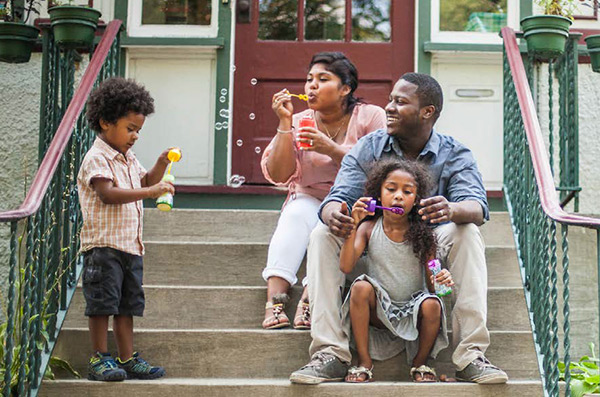
UI Health performs tri-annual community health needs assessments to identify and prioritize the health needs of people who live in the communities we serve. The 2022-2023 UI-CAN (UI Health-Community Assessment of Need) and 2023 Implementation Plan are now available, discussing physical and mental health conditions, challenges in accessing care, and the social and economic factors that impact health and charting a plan to address these needs over the next 3 years.
Community Outreach Intervention Projects Heading link
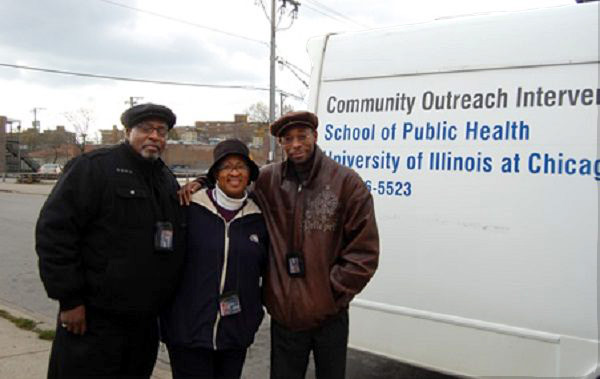
The Community Outreach Intervention Projects (COIP), part of the UIC School of Public Health, was founded in 1986 to address HIV/AIDS, particularly among people who use drugs. Operating from storefront sites in Austin, Humboldt Park, West Englewood, South Chicago and Uptown, as well as mobile units that serve additional communities, COIP provides street-level interventions for people with substance use disorder, as well as for people with HIV, hepatitis or other infectious diseases associated with substance use. COIP employs the Indigenous Leader Outreach Model, in which former drug users deliver the intervention services and assist in conducting community-based research.
Illinois Heart Rescue Heading link
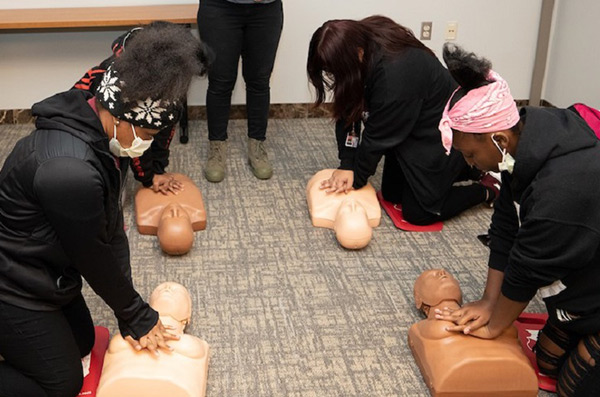
Launched in 2012, the Illinois Heart Rescue (LIHR) program at the University of Illinois College of Medicine has made great strides in increasing the chances of surviving a sudden cardiac arrest. By training community members in the proper application of CPR, the program ensures that bystanders can intervene and provide life-saving CPR until medical professionals arrive on the scene.
ILHR has trained more than 30,000 Chicagoans in CPR and provided over 50 automated external defibrillators to groups that could not afford them. The program has ensured that a greater number of Black, brown and female mannequins are used in training, part of the program’s goal of reducing disparities in the application of CPR. Marginalized Chicago communities served by the program have seen significant increases in the percentage of cases where bystander CPR was performed, with increases as high as 53%.
Community Health Advocacy Projects Heading link
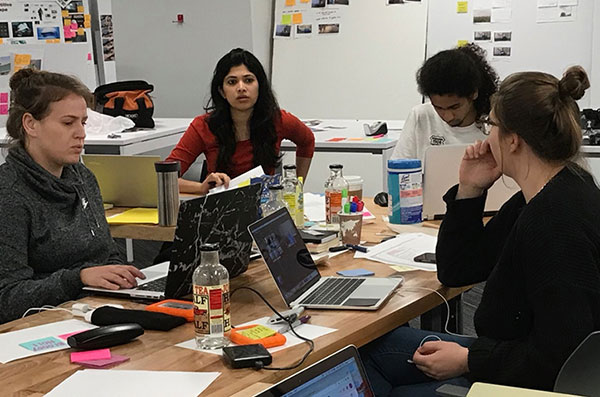
UI Health faculty are partnering with OSF HealthCare clinicians to develop innovative solutions to health-related problems in urban communities, through the Community Health Advocacy (CHA) program at UIC Innovation. In 2022, more than $480.000 in CHA grants were awarded to support health innovation, with more than $1.7 million awarded overall. Projects selected for funding have focused on developing solutions in these critical areas:
- Exploring prototypes for the transformation of care and community-based initiatives that address social determinants of health,
- Improving outcomes and reducing health care disparities, and
- Increasing access to care and reducing barriers to care for individuals from all racial and ethnic backgrounds.